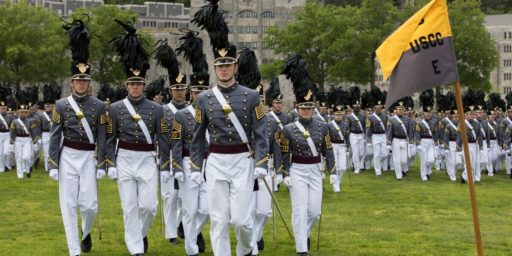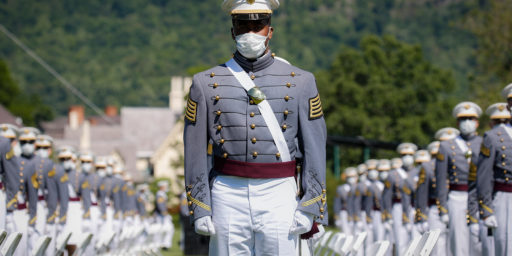West Point Focuses on Terrorism
AJC: West Point focuses on terrorism
Because the interval between classroom and combat zone for young officers has been reduced from years to months, special efforts are being made to give cadets more practical information about the ongoing war, the academy’s superintendent said Friday.
“These cadets are focused. They know they’re going to Iraq, Afghanistan or somewhere and they want to hear what they are going to face in combat,” said Lt. Gen. William Lennox, who was in Atlanta promoting the academy and meeting with business leaders.
Veterans who have served in Iraq and Afghanistan are regular visitors to West Point classrooms, where cadets find their stories much more meaningful than a dozen lectures from professors who have not been there, said Col. Tom Kolditz, head of West Point’s Department of Behavioral Sciences and Leadership.
“You have to inspire cadets; it’s not enough to train and educate them,” Kolditz said.
Learning to fight isn’t the only thing being taught these days. An Arabic-language course has been established, with about 160 cadets enrolled. Experts in Middle Eastern politics and social customs are brought in to lecture.
These changes make sense although one wonders what has been displaced from the curriculum. The academy should mainly focus on educating cadets and transforming them into future leaders rather than training them in the specifics of current operations. There’s plenty of time for that at their Officer Basic Course. Arab language training is a terrific idea, though. Cadets have to learn a language and, frankly, it’s surprising that only 160 out of nearly 4000 cadets are taking it. The utility of French, German, and Spanish for a future military officer pales in comparison.





Arabic is a very, very hard language for the native English-speaker to learn, James. That’s why the Defense Language Institute basic Arabic course lasts 16 months (that’s full-time instruction, for anyone unfamiliar with DLI), and the graduates are merely to the point where they can truly start learning the language.
Add to that that there are at least 15 distinct, active Arabic dialects, and no one (and I mean NO ONE) speaks the “standard” dialect, and you start to gain an appreciation of the difficulty.
Boyd: That’s certainly true. It’s probably even worse than Chinese, another language taught at the academy, in that regard. But I’d rather have cadets graduate with two years of college Arabic and thus a rudimentary command of the language than emerge with advanced conversational skill in a language they won’t likely need or that apply to a country where most people speak English anyway.
One must also consider the difficulty of hiring instructors with sufficient facility in the language and other skills to teach. Providing training to a large number of cadets would require hiring several instructors, unless you go to a large-room lecture format which could impart only superficial knowledge.
—